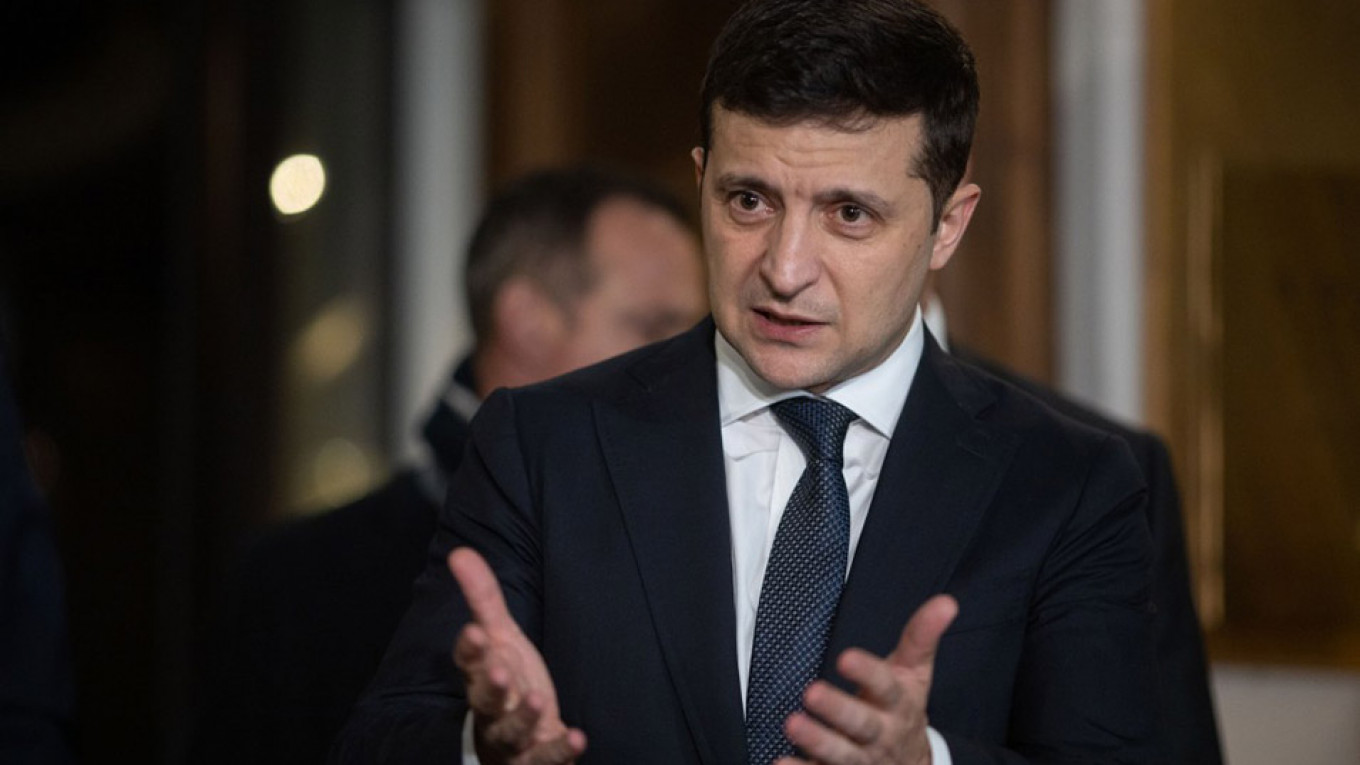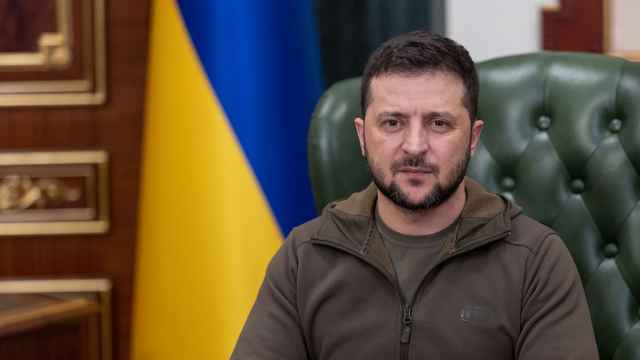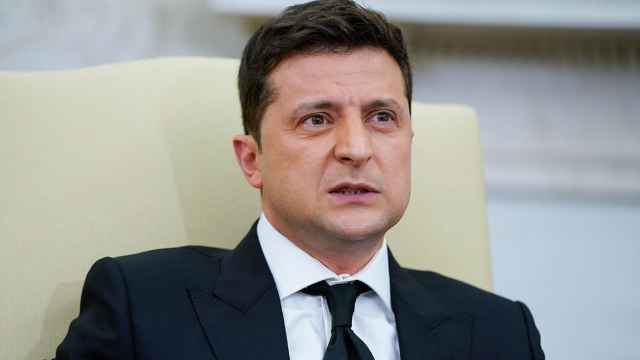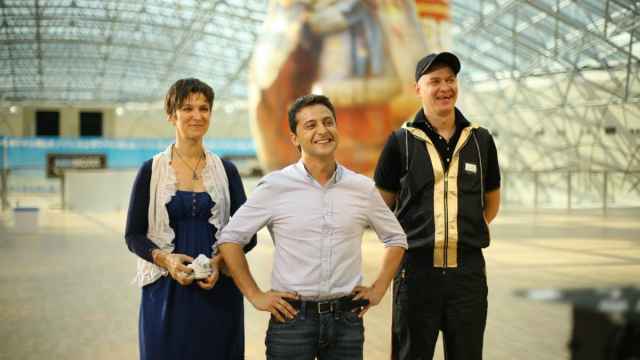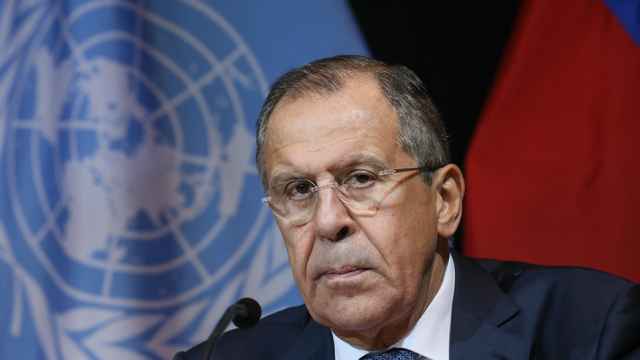To many Americans, Ukrainian President Volodymyr Zelenskiy is merely a character in the U.S. impeachment drama, an awkward English speaker from a remote, corrupt country that would be eaten up by Russia if not for U.S. assistance. But the former comedian who took Ukraine by storm earlier this year is much more than that: He’s the only kind of threat Russian President Vladimir Putin has any reason to fear.
The election campaigns Zelenskiy ran this year, which the world didn’t watch attentively enough, were widely followed in Russia: the Ukrainian elections were the most searched event of 2019, according to the Russian search engine Yandex, and Zelenskiy was the most searched personality. For Russians, the fact that someone like him could become president in a neighboring post-Soviet country provides ample food for thought; Russians have lived so long under Putin that no cat born during his predecessor’s rule is likely to be alive today. To add insult to injury, Zelenskiy, in his endearingly bungling way, keeps getting results that eluded his more experienced predecessors, even if they’re not enough yet to make Ukraine truly European.
No laughing matter
Zelenskiy’s political career began in the first minutes of the year. The Ukrainian TV channel 1+1, which had run the comedy shows of his crew, Kvartal 95, bucked a long-standing tradition by replacing President Petro Poroshenko’s New Year’s address with a short announcement by Zelenskiy that he was going to run against Poroshenko in the March presidential election.
Not everyone took “the clown” seriously then: Zelenskiy, only 41, had no political experience, lacked the gravitas of his rivals and had once pretended, on national television, to play the piano with his genitals. He had no ground game, having only recently registered a political party, Servant of the People, named after a successful TV series in which Zelenskiy played a history teacher who unexpectedly gets elected president of Ukraine. He refused to make any firm promises, talking only about things he’d like to try, such as ending the war with Russian proxies in the country’s east. He spoke better Russian than Ukrainian, and his Jewishness made him an unusual presidential contender in a country where almost half the adult population harbors anti-Semitic attitudes, according to the Anti-Defamation League.
But a lean, masterful, social media-savvy campaign quickly propelled Zelenskiy to the top off the polls. Poroshenko ran on a conservative platform that stressed building up the Ukrainian language and the military, as well as a stronger Ukrainian Orthodox church free from Moscow’s influence. But those declared values contrasted sharply with a string of corruption scandals in Poroshenko’s close entourage. Ukraine was ready for radical change, not retrenchment. The voters were so tired of Kiev’s post-Soviet political swamp that they didn’t much care if the change were as chaotic and comical as in the “Servant of the People” series. They wanted sincerity above all.
Zelenskiy also received unexpected support from well-known reformers who had tried to revive Ukraine’s economy under Poroshenko but were forced out as oligarchs’ interests prevailed. Former ministers with strong reputations in the West made the comedian acceptable to Ukraine’s foreign donors and investors — and Zelenskiy didn’t even have to promise them jobs.
Zelenskiy came in 13 percentage points ahead of Poroshenko in the first round of the election on March 31, and that led to a stunning visual: A debate between Zelenskiy and Poroshenko in front of more than 60,000 people in the country’s biggest sports arena in Kiev. The show was avidly watched in Russia, where about 6 million people saw it in real time. Maria Zakharova, spokeswoman for the Russian Foreign ministry, likened the event to a circus performance meant to “keep deceiving Ukrainians,” and other Russian officials poured scorn on the Ukrainian politicians, who at one point kneeled before their voters — something impossible to imagine in Russia. But Ukraine envy was widespread on the Russian social networks that day. “At least they have a choice,” a commentator wrote on the hip-hop-themed Russian website Flow, where the debate was discussed as a rap battle.
“It’s better to be a pig in a poke than a wolf in sheep’s clothing,” Zelenskiy quipped during the debate. He won it, and he prevailed in the run-off by a landslide, 73% to 24%. After this, it was no surprise in July that the Servant of the People party won 254 seats in Ukraine’s 450-seat parliament, the first outright majority for any party in Ukraine’s history. In one constituency, a wedding photographer representing the party beat a billionaire; in another, a schoolteacher defeated a former presidential chief of staff — something else that could never happen in Putin’s Russia.
Skirting disaster
What can one expect from a novice president, one of the youngest leaders in the world, backed by a parliamentary faction of wedding photographers and other lucky outsiders, in a country ravaged by a slowly-simmering war and abandoned by millions of workers? Poroshenko and his supporters anticipated a disaster: The economy mismanaged, national interests betrayed to Putin. Zelenskiy, however, has managed to hold his own, despite some understandable setbacks, and he’s begun making important changes.
Zelenskiy and his young team had been naive about some pretty basic things. During the election campaign, the future president promised to move to a modern office from the Soviet-style presidential administration building on Bankova street, but it became clear almost immediately after the election that such a move would be too expensive and difficult from a security point of view. And if voters expected Zelenskiy to ride a bicycle to work, like his character in “Servant of the People,” they were predictably disappointed, even if Olexiy Honcharuk, at 35 Ukraine’s youngest ever prime minister, did make a video of himself riding a scooter along the government’s corridors.
Equally predictably, it proved difficult for Zelenskiy to move as quickly as he’d like to resolve Ukraine’s conflict with Russia. It took considerably longer than planned to carry out the first major prisoner exchange in years with Russia and its proxies in eastern Ukraine. Zelenskiy did manage to get 35 prisoners freed in September, including movie director Oleg Sentsov, who had become internationally famous for his months-long hunger strike in a Russian prison, but he had to give Russia a key witness and potential accessory to the 2014 downing of Malaysia Airlines Flight 17, a tragedy now being investigated by a Dutch-led international team.
Zelenskiy also discovered that, although his efforts to achieve a mutual troop pullback in eastern Ukraine were approved by 59% of Ukrainians, nationalist combat veterans were fiercely opposed to anything that looked like a Ukrainian retreat. It took Zelenskiy weeks to get the vets — armed though no longer in service — to stop preventing the pullback. This important group, treated as untouchable heroes under Poroshenko, will remain a problem for Zelenskiy. At some point, he may have to move openly against them. The current trial of several nationalist combat vets for the 2016 murder of a prominent journalist in Kiev provides the president with an opening for such a shift.
Earlier this month, Zelenskiy’s first meeting with Putin ended uneventfully: The Ukrainian leader doesn’t really have a mandate for an audacious gambit like holding elections in the areas now controlled by pro-Russian forces. Poroshenko is waiting in the wings for Zelenskiy to try something like this, and another street revolution — Ukraine has already had two — can’t be ruled out. Russia wants the Ukrainian president to change the constitution, granting a broad autonomy to its eastern areas, but the constitutional amendments proposed by Zelenskiy this week don’t do that, proposing instead a relative empowerment of the local authorities throughout Ukraine, but under the control of presidential representatives.
Another big problem for Zelenskiy is his old business relationship with Igor Kolomoisky, the billionaire owner of 1+1 TV. When it became clear that Zelenskiy would win the presidency, Kolomoisky moved back to Ukraine from self-imposed exile in Israel. He’s trying to win compensation for the 2016 nationalization of his bank, Privatbank Commercial Bank PJSC, which the Ukrainian government under Poroshenko accused him of plundering. Kolomoisky denies the accusations; meanwhile, former and current managers at the National Bank of Ukraine complain that Kolomoisky is waging an intimidation campaign against them.
Zelenskiy has squandered much of his political capital with the slow-motion peace process, inaction in response to suspicions of excessive closeness to Kolomoisky and the lack of a spectacular anti-corruption effort, which many expected from Zelenskiy the clean-hands candidate. He’s still supported by a majority of Ukrainians, but no longer by three-quarters of the country.
It’s possible, however, that Zelenskiy’s popularity will rebound thanks to an improving economy. Zelenskiy already has been blessed with an unexpected economic growth surge, supported by a bumper harvest and a general increase in optimism since his election. In the three months through September, the median of six economic forecasts tracked by Bloomberg was 3.3% real gross domestic product growth; in reality, the Ukrainian economy expanded by 4.2% year over year.
There are reasons to expect Ukraine to keep beating such high expectations (forecasters tracked by Bloomberg see a 3.1% expansion next year and a 3.4% one in 2021). Zelenskiy has moved to end Ukraine’s infamous land sales moratorium next year, legalize gambling, liberalize alcohol production and privatize government-owned companies, including the state railroad monopoly. The government also is working on improving tax collection. And, though the International Monetary Fund had its doubts about the new government’s ability to overcome obstacles such as Kolomoisky's seeming ascendancy, it has given its preliminary approval to a three-year $5.5 billion lending program for Ukraine earlier this month.
Though some of these measures, especially opening the land market and the closing of tax loopholes, are unpopular, they should stimulate growth in the immediate future. But even today, Ukraine’s economy is more dynamic than Russia’s.
A human face
There’s little doubt that Zelenskiy’s progress is watched jealously in the Kremlin. If he proves a winner, Putin will look dated and clueless next to the young, sincere and very human leader of the neighboring country. Even now that Zelenskiy’s presidency is more about promise than provable progress, the unflattering comparisons can hardly be avoided.
Earlier this month, the Russian TV channel TNT unexpectedly aired the first three episodes of “Servant of the People.” One of them, however, included a nasty Putin joke. Zelenskiy, playing the accidental president, is offered a choice of expensive watches to wear; one is a Hublot, and Zelenskiy’s character is told that Putin wears watches of the venerable Swiss brand. In fact, the Russian leader has never been seen with a Hublot on his wrist, but the brand name sounds similar to a Russian obscenity that Ukrainian soccer fans have firmly attached to Putin’s name in a popular chant.
The episode with the joke was aired in full to the Russian Far East, but then someone apparently noticed the impermissible mockery of the Russian president, and the bit about the watch was cut from the broadcast for the rest of Russia. Then TNT announced it would no longer show “Servant of the People” on its free-to-air channel and that it never intended to air it in full.
“I really regret this,” Zelenskiy commented on the Russian channel’s decision to pull the series. “It’s a strategic matter. You know who has the nuclear weapons and who has ‘Servant of the People.’”
He couldn’t be more right. He’s Ukraine’s not-so-secret weapon against the leviathan to the northeast, because he’s living evidence that a former Soviet country doesn’t have to tolerate a fusty authoritarian regime. Government with a human face isn’t about imperial greatness, it’s fallible and fragile, but — especially if it gets results — it can be irresistible to people who are tiring of greatness at the price of stagnation and oppression.
The Zelenskiy weapon doesn’t require help from the U.S. to deploy, although the Ukrainian president certainly would appreciate U.S. support once American politicians remember that Ukraine isn’t just an impeachment prop. It’s up to the novice president and the Ukrainian people to make sure it works. There are good reasons to hope that, in the longer run, it will.
This article was first published by Bloomberg.
A Message from The Moscow Times:
Dear readers,
We are facing unprecedented challenges. Russia's Prosecutor General's Office has designated The Moscow Times as an "undesirable" organization, criminalizing our work and putting our staff at risk of prosecution. This follows our earlier unjust labeling as a "foreign agent."
These actions are direct attempts to silence independent journalism in Russia. The authorities claim our work "discredits the decisions of the Russian leadership." We see things differently: we strive to provide accurate, unbiased reporting on Russia.
We, the journalists of The Moscow Times, refuse to be silenced. But to continue our work, we need your help.
Your support, no matter how small, makes a world of difference. If you can, please support us monthly starting from just $2. It's quick to set up, and every contribution makes a significant impact.
By supporting The Moscow Times, you're defending open, independent journalism in the face of repression. Thank you for standing with us.
Remind me later.



